Lady Hoare and the thalidomide story
Sir Frederick Hoare and his wife Mary lived at 78 Hamilton Terrace during the 1960s. Frederick was a partner in the family Hoare’s Bank and became Lord Mayor of London in 1962. During his year in office his wife established a charitable trust to raise money to provide support for some 600 families whose children had been affected by the thalidomide tragedy. This drug, first marketed in West Germany in 1957 was taken during pregnancy to help with morning sickness, but had produced babies with disabilities like half an arm or leg. Concerns regarding birth defects arose in 1961 and the medication was removed from the market in Europe that year. In the UK, the drug was licensed in 1958 and withdrawn in 1961.
Of the approximately 2,000 babies born in the UK with defects, around half died within a few months and 466 survived to at least 2010, but to begin with there was little specific help for the affected families and it was not until 1968 after a long campaign by Harold Evans, editor of the Sunday Times, that a compensation settlement for the UK victims was reached with Distillers Company, (now part of Diageo), which had distributed the drug in the UK, and Distillers Biochemicals paid out approximately £28m in compensation following a legal battle. Meanwhile Mary as Lady Mayoress had fronted an appeal for £250,000 to help the families , which included rounding up many celebrities like Judy Garland who donated her £2,000 fee for appearing at the London Palladium in 1963.
Lady Hoare wrote later: The public reacted to our continuing appeals and large sums of money became available. A considerable proportion of this was spent immediately on specially equipped units for the making and fitting of special apparatus to the children, and on welfare, for it was evident that neither the parents nor the children could wait for the wheels of bureaucracy to grind. Yet now the scene has changed, for the babies have become children and one outstanding factor has emerged – the full devastation of the damage done to the children by the drug Thalidomide. These children are not sick, but they sustained damage in the womb as one might be damaged in an air, train or car crash. Through an appalling mistake in the constitution of a man -made drug these children are damaged irreparably for life. This thought must be for ever in the minds of all of us who work towards the habilitation of these children into the life of the community. With the development of the babies into childhood the urgency of their call for help had in no way diminished. Time passes rapidly and the few years of childhood will be gone, giving place to the normal problems of adolescence.
Rosemary Seaton, one of the qualified Medical Social workers employed by the charity, wrote in March 2021:
We met at Hamilton Terrace several times a year in the room overlooking the garden for training, discussion and exchange of ideas and information, plus an excellent buffet lunch. We were entitled Welfare Workers, though I think we all were qualified Social Workers, probably all Medical ones, previously known as Almoners. I am sure we all valued and looked forward to the meetings, I certainly did, largely of course from a professional point of view, as were were all spread arounds the country, working on our own and needed to get together. For me, as a country cousin from the North East , it was also a lovely opportunity for a visit to London.
A letter from Mrs Seaton to Lady Hoare in 1968 gives examples of their work: At present there are 35 families on the list for this area. Of these 3 are in the extreme West, Seascale, Cockermouth and Cumberland, and were outside my contract for visiting. However I see them periodically and all within the last year, at the clinic at the Royal Victoria Infirmary, Newcastle, and have the opportunity for a talk. All are doing well and no particular problems have arisen. If they do, all the parents know how and where to find me.
Also at the clinic I constantly see the new babies and parents who appear from time to time and who are referred at once thereby benefiting enormously from help and reassurance at an early stage and also from the facilities available because of the measure taken when the thalidomide situation arose. Most of these children have fairly simple conditions (medically) eg lack of forearms, I also meet the parents and give the the opportunity for ongoing contact with the society but have been seen periodically at the clinic.
This leaves me with 27 families with whom I am actively in touch either by phone or letter in addition to home visits. The work done falls mainly into the following categories.
- Arrangement for visits to hospitals – payment of fares, discussion of problems, follow up visits.
- Education – contact with schools
- Finance – debts and general financial worries
- Car loans
- Marital problems
- General support
- employment – this well become increasingly important
- Housing
- Holidays – very few cases and I feel I would like to do more
- Discussion re legal action This is on the increase and many families are worried re the financial implications. Also I am sorry to find that some are being accused of being litigious, sometimes by GPs who do not realise that many families had never contemplated action until being recently advised to do so. Certainly none of the parents up here seem to be at all vindictive and it hurts them when people treat them as if they are. In some cases (very few anyway) I am able to interpret the situation to the critics.
(In 1970 the Lady Hoare Trust expanded its remit to include other physically disabled children and as part of Contact a Family the trust continues to offer practical help and advice to families with disabled children). The British Thalidomide Children’s Trust was set up in 1973 as part of the legal settlement between Distillers Company and 429 children with thalidomide-related disabilities. In 1997, Diageo (formed by a merger between Grand Metropolitan and Guinness, who had taken over Distillers in 1990) made a long-term financial commitment to support the Thalidomide Trust and its beneficiaries. The UK government gave survivors a grant of £20 million, to be distributed through the Thalidomide Trust, in December 2009.
Lady Hoare was awarded an OBE in 1972 but sadly she died of cancer a year later.
There is a film on You tube of a party that was held in 1963 in the garden at 78 Hamilton Terrace for thalidomide families attended by various celebrities.

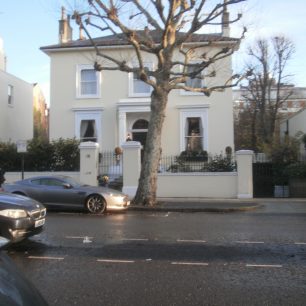
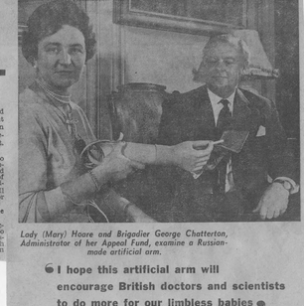
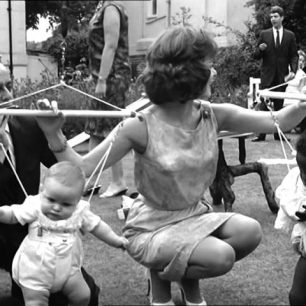
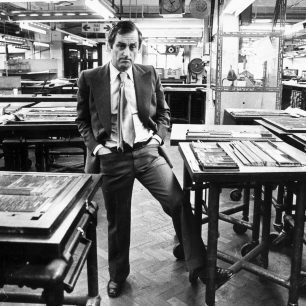
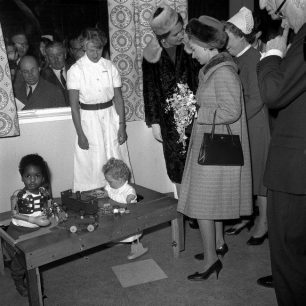



Comments about this page
Hi,
Mrs Rosemary Seaton , I would be very interested to hear of your work there, could you give me your email please ? As I attended the Four Winds Norman’s Bay with my parents on a respite holiday with my parents organised by the Lady Hoare Trust. I am trying to find some information , if you could let me have your email address that would be very helpful.
My email is
Broadband1961@btinternet.com
Best Regards ,
Andrew Gillies.
I was the second Medical Social Worker in the country (North East) to work with what became a large and dedicated team covering all the country. We were often called together for training and exchange of ideas and experiences, at Hamilton Terrace where we received Lady Hoare’s generous hospitality and wise encouragement. I can find no record of the work of this team, only of the later Thalidomide Trusr. Why. ? !.
Tried to reply to your email but it was returned. Please email me at janeleaver@cgardens.co.uk
My name is Annette O’Callaghan. My mum worked for Lady Hoare at the house in Hamilton Terrace . Mum helped sort out clothes that were donated for resale for the charity . My siblings and I spent a lot of time at the house, often with some of the thalidomide children. Lady Hoare was very kind to my mum and let her keep some of the clothes and we were allowed on day trips to Pevensey Bay with the children . Lady Hoare had two dogs one was an Old English sheepdog called Oliver who I adored . This was mid 1960s
Is there any chance you could send us a copy of your photo to go with this post? Bridget Clarke editor
I am certain I am not alone as one of the “Thalidomide babies” to have had the very great honour of meeting this wonderful lady. I have a fantastic picture of her holding me (I would have been about 2 years old)
Add a comment about this page